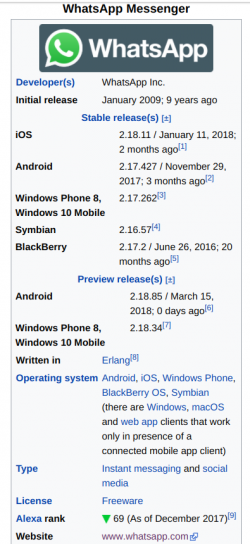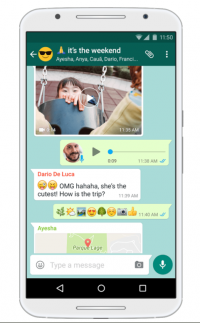WhatsApp is a free mobile application that allows users to send messages, images, video, audio and more. It is accessible on smart phones, as well as desktop computers. WhatsApp uses internet connection and WIFI in order to facilitate communication between users. The app is meant to serve as a replacement for regular SMS text messages with over 900 million users worldwide using the service. [1] The application does not require a mobile plan or offer any services for purchase.
Contents
History
WhatsApp, was founded in 2009 by Brian Acton and Jan Koum, both former employees of Yahoo!.[2] Back in 2014, Facebook bought WhatsApp for approximately 19 billion dollars. Whatsapp has grown a large client base around the world and allows for easy communication between different countries. Currently, more than 1.5 billion users are active on Whatsapp each month. [3]
Features
Texts
WhatsApp uses your phone's internet connection to send messages, avoiding any SMS fees that may apply to phone carriers. This free service remains one of the main attractions of using this app, as the service allows free messages from anywhere around the world.
Group Chats
This features allows users to form gorups of up to 256 peopoe. You are able to share messages, photos, or videos between users from all across the globe. WhatsApp also allows you to name the group and mute or customize notifications.
Voice and Phone Calls
Within the service a user is able to talk to family and friends for free. The app uses your phone's internet connection instead of your cell plan's voice minutes, eliminating any charges. Similar to Apple's Facetime, WhatsApp's video calls allows for users to have face-to-face conversations from anywehre around the world.
Document Sharing
Similar to other messaging apps, WhatsApp also allows users to send PDFs, documents, spreadsheets, slideshows and more. A user is able to send any document up to 100 MB.
Ethical Implications and Concerns
Ethical implications with Whatsapp largely include user privacy violations. Online privacy is a common concern when for online platforms such as WhatsApp and Facebook messenger. In the beginning, WhatsApp was known for securing user information and maintaining user privacy. However, since forming a partnership with Facebook in 2014 [4], the company revised their terms of use to state that the personal information of the user will be shared with Facebook and other third party companies. [5]
Current News
Over the past five years, the United Kingdom has issued bans on the popular application for a failure to cooperate with police investigations. [6] Facebook has also prevented UK citizens from understanding the type of data that is shared between friends and third party sources. The UK has currently lifted the ban on the application and allowed users to continue usage at their own risk.
The legislation now has rules that include giving individuals the right to know the information an organization like WhatsApp holds about them, which includes the data obtained from them. However, Facebook is not in agreement to share their information it has gathered about people via their friends and acquaintances.[7] In response WhatsApp has signed an undertaking, declaring that it will not share any user data with Facebook until the General Data Protection Regulation (GDPR) comes into force on 25 May of 2018. In previous years, this app was banned in Brazil, China, Turkey, Iran, and many other concerns due to similar issues.
The General Data Protection Regulation is a regulation in EU law on data protection and privacy for all individuals within the European Union. [8] Moreover, it addresses the export of personal data outside the EU. The GDPR aims primarily to give control back to citizens and residents over their personal data and to simplify the regulatory environment for international business by unifying the regulation within the EU.[9] It was adopted on 27 April 2016, but will become enforceable on 25 May 2018.
See similar topics
References
- ↑ “Explainer: What Is WhatsApp?” Webwise.ie, 26 Jan. 2018
- ↑ “WhatsApp.” Wikipedia, Wikimedia Foundation, 3 Apr. 2018
- ↑ https://www.statista.com/topics/2018/whatsapp/
- ↑ https://gadgets.ndtv.com/apps/news/facebook-to-buy-whatsapp-in-a-19-billion-deal-485677
- ↑ https://gadgets.ndtv.com/apps/news/whatsapp-upi-payments-data-is-shared-with-facebook-1835087
- ↑ “Facebook-WhatsApp Data-Sharing Plan Blocked by UK Watchdog.” BBC News, BBC, 14 Mar. 2018
- ↑ “Facebook-WhatsApp Data-Sharing Plan Blocked by UK Watchdog.” BBC News, BBC, 14 Mar. 2018
- ↑ https://en.wikipedia.org/wiki/General_Data_Protection_Regulation/
- ↑ https://en.wikipedia.org/wiki/General_Data_Protection_Regulation/


